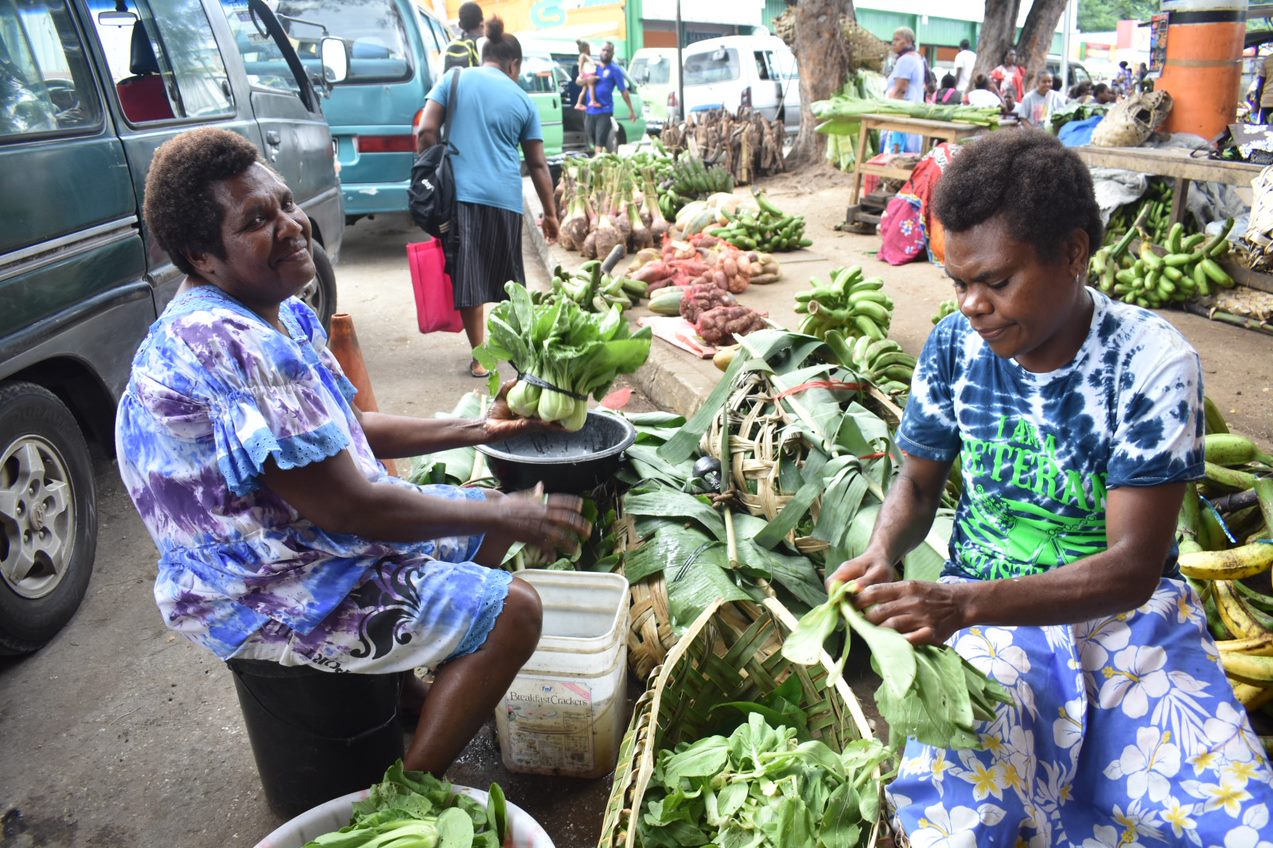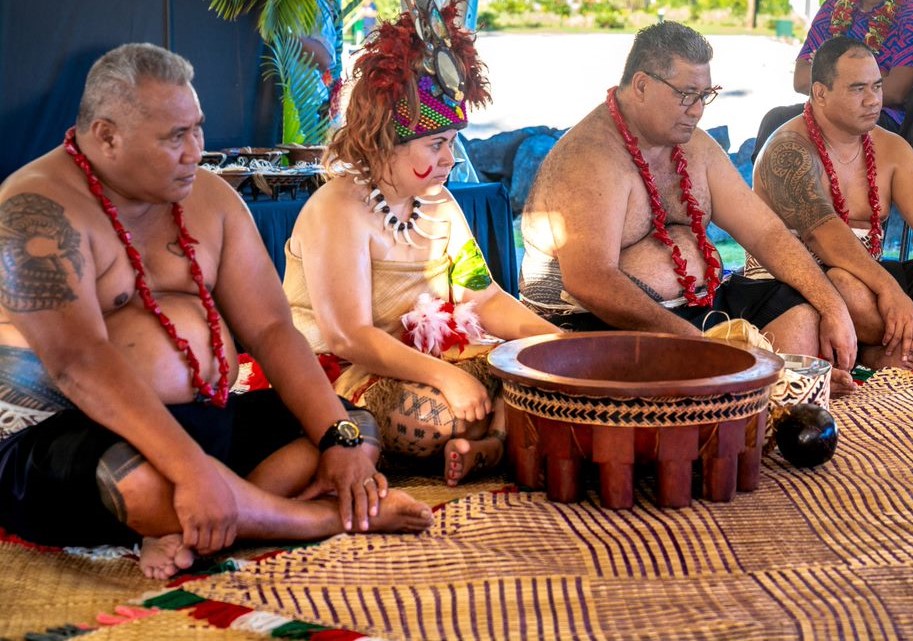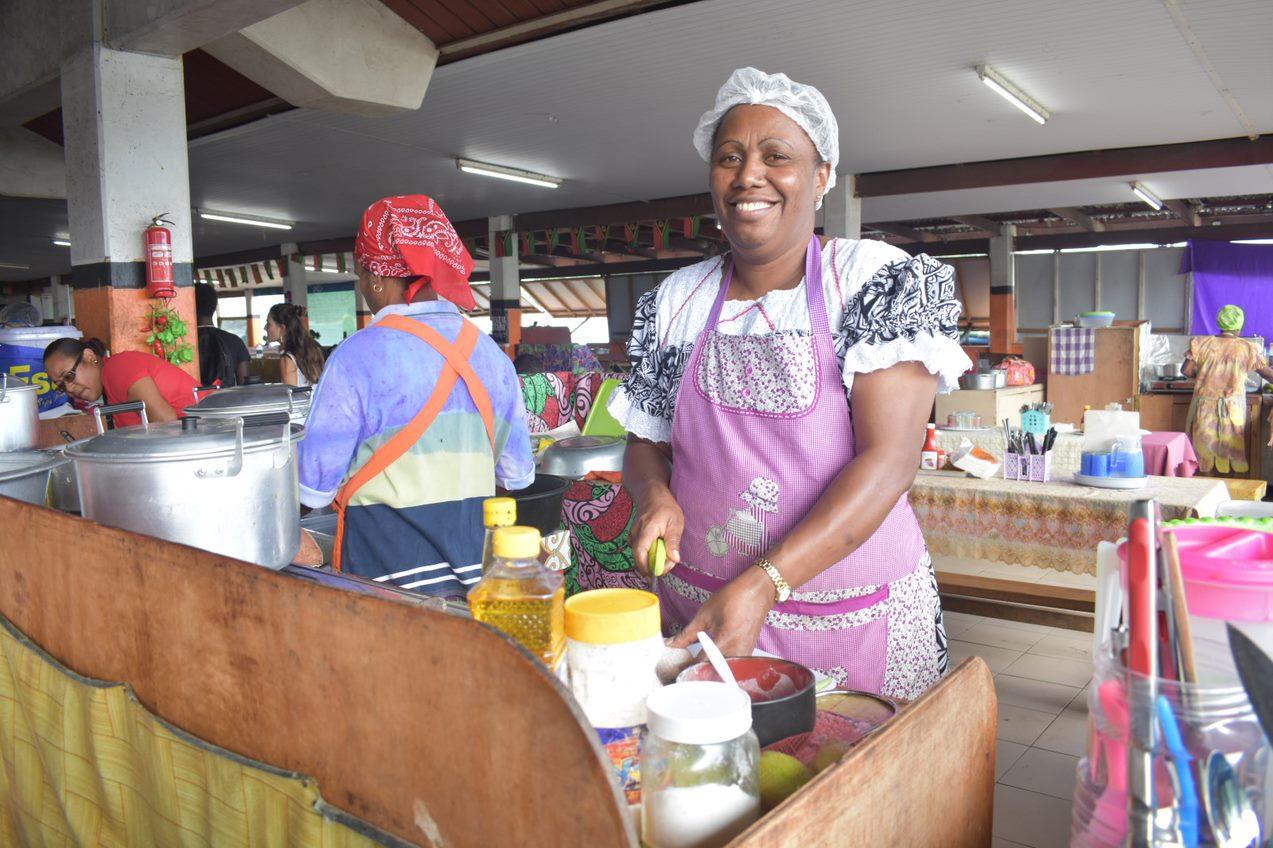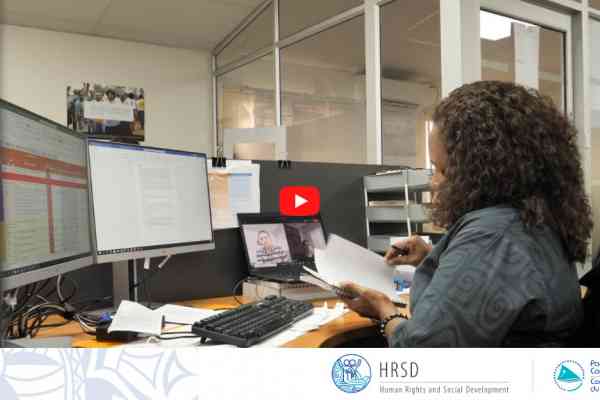The Pacific is a unique region with its Island States divided by the vast expanse of oceans, each with their own set of distinctive economic, geographic and cultural diversities and identities. The Covid-19 pandemic has brought about a rare set of challenges and, just like the rest of the world, ‘Oceania’ is facing some harsh realities in terms of its socio-economic development and approaches. In response, a new approach to development is emerging that draws on Pacific cultural heritage to protect the land and peoples in a way that can stand the tests of time and future global crises. It is an approach that seeks to transfer ownership of development to the people it is intended to serve – it is a People-Centred Approach.
Covid-19 in the Pacific
While the geographic isolation of the region worked positively in favour of island states in the Pacific enabling the influx of infections and local transmissions to be well controlled (with a few exceptions such as Fiji, Papua New Guinea and the French Territories), the measures required to do so have changed the lives of almost everybody.
Whilst the repercussions of Covid-19 look different from one country to the next, a common thread is that the impacts are not being felt equally. According to the 2020 Pacific Human Rights Situational Analysis Report “COVID-19… has entrenched social divisions, worsened inequality and further marginalised groups including, but not limited to, women, persons with disabilities, children, older persons, and LGBTQI persons of diverse sexual orientation, gender identity and sex characteristics”.[1]
One of the most obvious areas that the pandemic has had a drastic impact on is the economies of Pacific Island Countries (PICs). Tourism is the main income earner for many countries in this region and the closure of borders and restricted travel have impacted this industry severely. It has led to loss of jobs and livelihoods for many who were part of the tourism and hospitality industry including airline workers, hotel staff, travel agencies, food and restaurant businesses to name a few. For example, countries such as the Cook Islands, where tourism previously constituted nearly 70% of GDP, the economic impact was immediate and devastating.[2] Overnight, tourism disappeared. For the period August to October 2020, visitor numbers were down 95% on the same period the previous year.[3]
While the loss of jobs led to an increase in poverty and decreased standards of living, many Pacific countries also faced threats to food security as a direct impact to trade due to widespread lockdowns.
For countries in the North Pacific for example, which are mostly reliant on imported foods, the pandemic disrupted food supply chains thus limiting the access for these countries to nutritious and healthy foods. This was evident in the early days of the pandemic when countries that exported majority of the staples to North Pacific diets imposed stringent restrictions on items such as flour (wheat) and rice. The reduced imports due to large-scale lockdown of ports and shipping services coupled with the unemployment of people due to the pandemic meant that the economies of most North Pacific countries slowed down significantly.
Women, for instance according to a 2020 UN report about COVID-19 and girls and women have been disproportionately affected as they held the majority of informal, unsecure and under paid jobs and were amongst some of the very first people to be laid off or temporarily suspended. Loss of financial independence for many of these women in the region together with the widespread lockdown due to the pandemic meant that they had no option but to stay within close confines of perpetrators which led to an increase in domestic violence cases throughout the region.
According to the 2020 Human Rights in the Pacific: A Situational Analysis Report “in the early months of the pandemic, an increased demand for domestic violence support services indicated that this situation was deteriorating further still. Helpline calls in Samoa jumped 150% from the same time the previous year while in Fiji the national domestic violence helpline recorded 500% more calls in April than it did in February.”[4]
Emerging evidence of the causes of this trend points to women and children being confined for longer periods with their perpetrators due to job losses and restrictions on movement. Those job losses also lead to increased financial pressures on families which can act as a trigger for family violence.[5]
Education and the lack of ICT facilities and capacity of Pacific schools is another area where development inequalities have been seen due to the pandemic. The large and scattered geography of PICs and the under-developed ICT infrastructure meant that the education opportunities and access for students in the Oceania region were limited during the lockdown period. The Pacific to date has focused on developing education curriculum which are classroom-based. Schools in many PICs for instance remained closed for almost 3 months in 2020 due to the pandemic, whereas countries like Fiji, who are still facing the second wave of the more severe delta variant, has exacerbated the situation with most students still attending classes remotely.
Development assistance received by many nations in the region from donors and inter-governmental agencies has also been focused on school/class-based education. This pandemic has brought to light the development deficiencies in ICT and highlighted the fact that the Pacific region still has not fully tapped into online education. Post Covid-19 governments need to fully make use of this opportunity to ensure resilience in this sector.
‘Leaving no-one behind’ is a central objective of the 2030 Agenda and the Sustainable Development Goals. Yet the fact that the effects of the pandemic is expanding the current development gaps, begs the question – where are we going wrong with our current approach to development?

Rethinking development in the Pacific
The pandemic has taught governments and development agencies that recent development gains is not as resilient as it believed itself to be. It is forcing countries and other stakeholders to re-think the way development programmes and projects are implemented at the community and grassroots levels.
According to the Pacific Community’s (SPC) Deputy Director General, Dr Paula Vivili, this pandemic has helped us realise that significant development gaps still exists in our development agendas in the region.
“This pandemic has really shown us that we are not as resilient as we believed ourselves to be, and despite the huge progress that we have made in many areas in the development paradigm, we have to recognise and accept that a lot of the groundwork has not been done, and it has taken a pandemic such as Covid-19 to help us realise that more needs to be done and this is just the beginning,” Dr Vivili said.
SPC’s Human Rights and Social Development (HRSD) division Director Miles Young believes that the development world is plagued by ‘development deficiencies’ whereby too often technical assistance is defined by what a country ‘should have’ as opposed to what the local communities actually need.
“I believe we need to redefine and re-think the way we provide development technical assistance to our Pacific countries so that we are making them resilient to withstand the threats from any pandemic or future disasters of this nature,” he said.
Young noted that existing development programmes in any sector whether it be education, fisheries, ICT, food security and agriculture, or geo-sciences post COVID-19 must be rooted in the realities and needs of local communities.
“I believe that giving the development narrative back to local communities is the only sure way of ensuring resilience to challenges such as COVID-19 and other catastrophes such as climate change.”
“Development assistance by donor partners and other stakeholders must be sustainable with a focus on human rights, cultural development, environment and gender inclusive while being grounded in the realities of local people and contexts.”
Dr Vivili agrees.
“I strongly believe that a people centred approach will lay the foundation in building sustainable scientific programmes, and will assist in creating development practice modalities and approaches in the post COVID-19 world,” he said.

A People-Centred Approach (PCA) to development
SPC has long been committed to upholding high standards of Social & Environmental Responsibility (SER), and even before the pandemic there was a growing realisation of the need for a development rethink. At the end of 2020 a new SPC SER policy was launched that committed to the adoption of a ‘People Centred Approach’ across the organisation.
SPC’s People Centred Approach has been designed over the past few years and seeks to empower Pacific people to achieve the maximum social outcomes by fostering community ownership and drawing on the rich cultural diversity of the region. It consolidates traditional frameworks and approaches such as a Human Rights Based Approach, Gender Equality and Social Inclusion.
“A people-centred approach places people and their environment at the centre of planning, implementation, decisions, discussions, monitoring, and reporting,” Young observed.
A PCA goes beyond what has been tried before, by incorporating Pacific culture as a core guiding component. By integrating a deep understanding of Pacific ways of knowing and being, approaches and methods, SPC’s development work achieves two goals. The first is to ensure that issues are explored, communicated and approached using traditional knowledge – solutions will therefore be better designed for the communities they are intended to serve and better understood, leading to long term ownership. The second goal is to explore how, through development work, Pacific culture can be strengthened and evolve to meet the demands of the challenges faced by society today and further strengthen the sustainability of outcomes and ensure that marginalised groups or peoples are not left behind.
This new way of working is by no means restricted to SPC and by adopting a People-Centred Approach, Pacific states and development partners can also ensure that the lessons of COVID-19 do not go unheeded and we build back better, together.
SPC roll out food security programme using PCA
Whilst SPC has begun to adopt and strengthen a PCA throughout its programme of work, until now there has not been any project with the primary aim of building a PCA in any sector. That is no longer the case after the launch of the North Pacific Food Security Governance Project (NPFSGP) – a new USAID project implemented by HRSD. NPFSGP is an extension of the Institutional Strengthening for Pacific Island Countries to Adapt to Climate Change (ISACC) Project.
USAID has a firm commitment to building the self-reliance of the Pacific and the partnership with SPC to pilot this innovative People Centred Approach is a natural one.
Young (HRSD) stated that the project aims to increase the overall impact of SPC’s work and support to the North Pacific countries of FSM, RMI and Palau by enhancing community awareness, participation and ownership of food security and emergency response in the three target countries.
“The ISACC NPFSGP seeks to address systemic barriers to food security and emergency response in FSM, RMI and Palau by incorporating principles of participation, human rights, accountability, non-discrimination, empowerment and transformation of social norms into the governance frameworks,” he said.
Young said that the aim for any development work carried out by SPC for its member countries, is to achieve long term impact for sustainability and the only sure way of doing so is when local communities and people are at the heart and centre of advice and assistance provided to them.
A People-Centred Future for the Pacific?
The ISACC NPFSGP will provide SPC an opportunity to pilot its People Centred Approach and build the tools to assess the added value it brings to development. The nature of a PCA requires the meaningful participation of affected communities so the approach will never be the same, depending on the context and type of work being undertaken.
As we embark on the road to COVID recovery process, SPC is playing its part to develop tools and guidance around its PCA framework to enable it to be applied consistently and effectively by its own divisions and external partners. The lessons learned from experiences such as the NPFSGP and other future work will serve to strengthen the understanding of what a PCA should look like, putting its future and ownership firmly in the hands of those it is designed to benefit.
“Placing people at the heart of development and responses is the only hope that we have to building back better after this humanitarian crisis,” Young said.
As the Pacific region picks-up and rebuilds after the COVID-19 pandemic it must do so in a way which makes countries in the region better equipped for challenges of this nature as compared to its pre-pandemic status quo. SPC believes that a People-Centred Approach is the way to achieve this, and this will mean all our Pacific communities being empowered to play their part.
The NPFSGP is underway in the Federated States of Micronesia, Republic of the Marshall Islands and Palau. To find out more visit https://hrsd.spc.int/node/536 or contact [email protected]
References:
[1] Human Rights in the Pacific: A Situational Analysis Report – 2020. Page 3.
[2] Prior to COVID-19, the Government of the Cook Islands estimated visitor expenditure would constitute 67% of GDP in the financial year 2019/20. Ministry of Finance and Economic Management, The Government of the Cook Islands 2019. Cook Islands Tourism Forecasts 2020-2024. Available at: http://www.mfem.gov.ck/images/WP3_CI_Tourism_model_paperV5.pdf
[3] Ministry of Finance and Economic Management, The Government of the Cook Islands 2020. http://www.mfem.gov.ck/statistics/social-statistics/tourism-and-migration
[4] UN Women 2020. https://www.unwomen.org/en/news/stories/2020/6/feature-pacific-crisis-centres-respond-to-covid-19-amid-natural-disasters
[5] For example, see the findings from the Samoa Ombudsman’s National Inquiry into Family Violence 2018. Available at: https://ombudsman.gov.ws/wp-content/uploads/2019/01/2018_-SHRR-2018-National-Public-Inquiry-into-Family-Violence_-English.pdf


